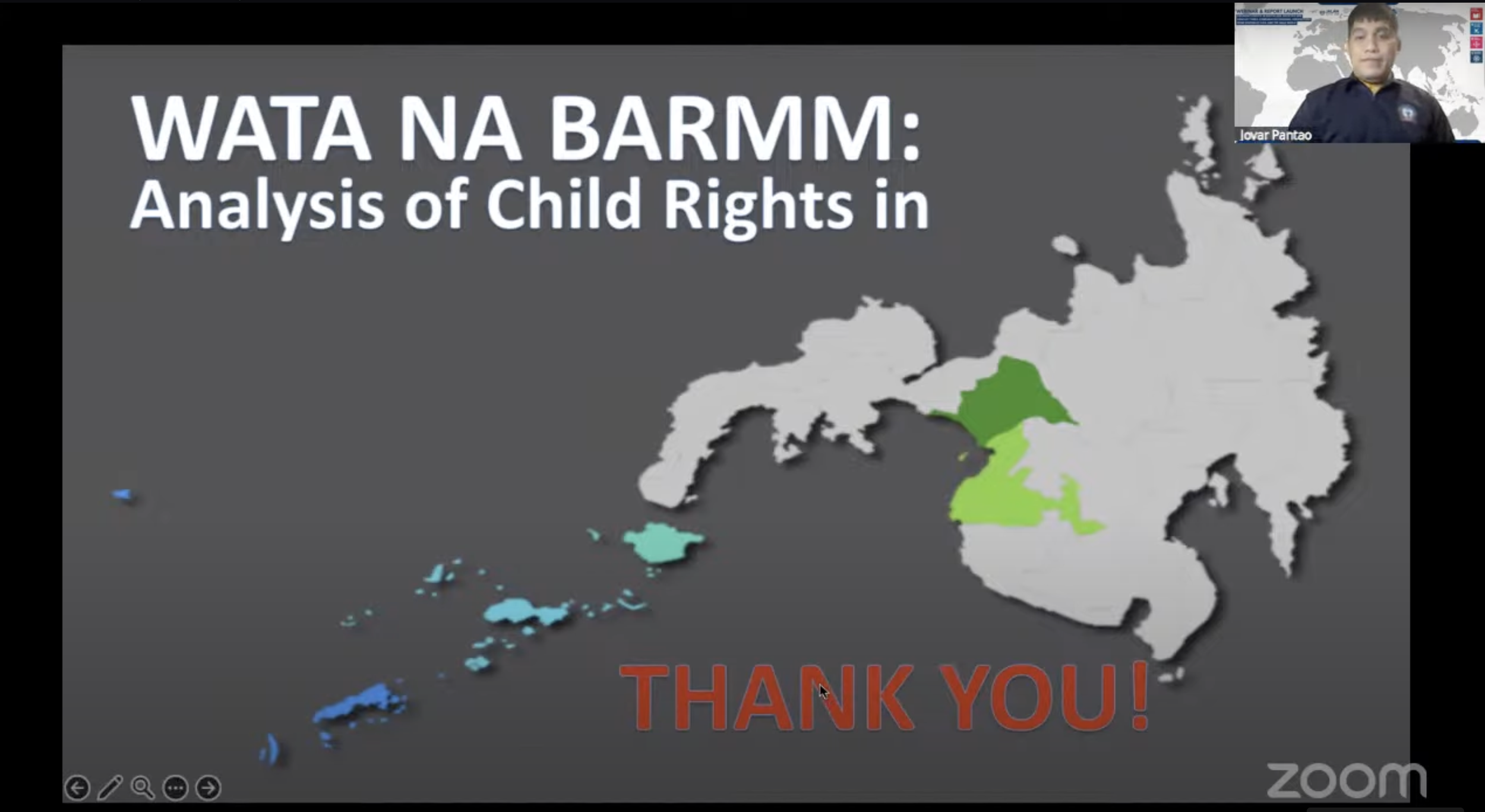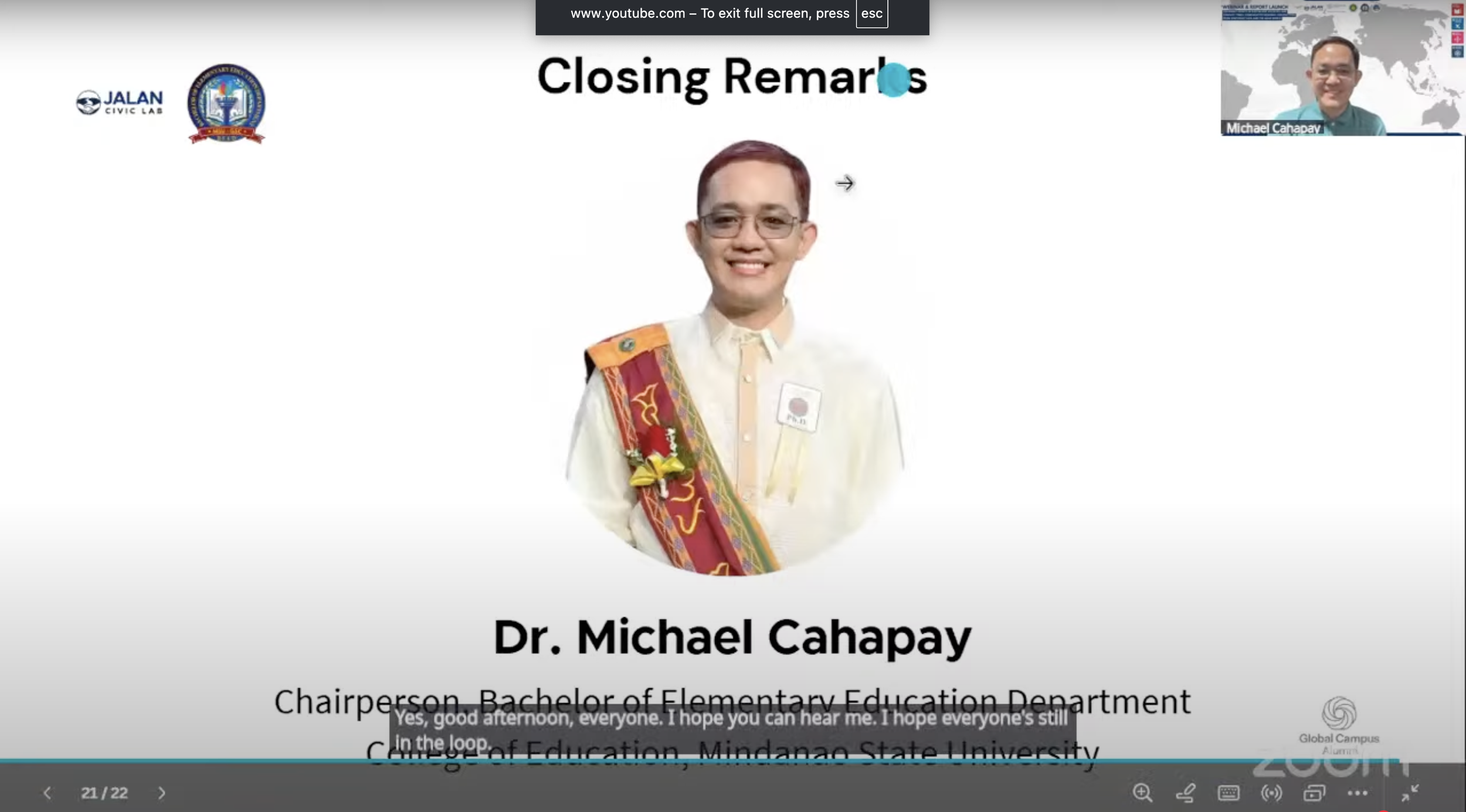JALAN Civic Lab & MSU-General Santos Co-hosted Webinar on Children’s Rights with support from Global Campus Alumni
Online
On 3 September 2025, an international webinar titled Children’s Rights in Digitalised Societies and Conflict Times: Perspectives from Southeast Asia and the Arab World brought together educators, researchers, and advocates to examine how digitalisation and armed conflicts shape children’s rights. Organised by Mindanao State University–General Santos, JALAN Civic Lab, and Global Campus Alumni, the event featured comparative perspectives from Southeast Asia and the Arab world, offering both sobering realities and pathways forward.
The session opened with remarks from Dr. Diane Mae Lozano (Dean, College of Education, MSU-General Santos) and Hazem Mizyed (Coordinator, Global Campus Alumni). Each welcomed participants and underlined that children today must navigate a “dual battlefield”: the violence of wars and the hidden dangers of the digital realm. Their words framed the webinar as both a launch of new policy research and a collective call to action.
Launch of the Policy Report
Co-authors Matt Yutthaworakool (JALAN Civic Lab, Thailand) and Ahmed Al Aydi (Palestine) presented their joint policy report, which draws on eight countries across Southeast Asia and the Arab world. Yutthaworakool warned of online sexual exploitation, cyberbullying, misinformation, and extremist recruitment targeting children, stressing that outdated laws and fragile institutions exacerbate these risks. Al Aydi described the dilemmas faced in conflict-ridden Arab societies, where children’s online activity is heavily surveilled, and digital platforms can both empower and endanger. Together, the report called for urgent harmonisation of laws with international standards, regional cooperation, and child-centred digital governance.
Read the policy report: https://www.jalanciviclab.org/policy-recommendations
Regional Case Study: Mindanao, Philippines
Dr. Jovar Pantao, Assistant Dean of MSU-General Santos, situated the Bangsamoro Autonomous Region in Muslim Mindanao (BARMM) within decades of conflict and fragile peacebuilding. He noted that digital tools have supported peace education, allowing children to continue learning when schools were disrupted, while also enabling youth peacebuilders to foster dialogue across communities. These efforts show how technology can sustain fragile gains in education and inclusion.
At the same time, Dr. Pantao cautioned that children in BARMM remain highly vulnerable. Armed groups have attempted to recruit youth through messaging apps and online games, while displaced or minority children often face cyberbullying. Limited digital literacy makes it difficult for families to recognise misinformation or protect personal data. He stressed that digital safety should be integrated into peace and development strategies, remarking: “For children to live free from fear, both bullets and harmful algorithms must be addressed.”
Regional Case Study: Gaza, Palestine
Ahmed Al Aydi described Gaza as a place where digital access is both a lifeline and a liability. Social media offers children opportunities for learning and self-expression, particularly when schools are damaged, and NGOs have introduced tablet-based education in shelters. These resources allow young people to remain connected to the world despite the blockade and bombardment.
Yet, digital life in Gaza is marked by surveillance and exploitation. Children’s social media accounts are closely monitored, leading many to self-censor out of fear of reprisals. Online harassment, extremist propaganda, and predators exploiting open networks add further dangers, also affecting refugee children in neighbouring countries. Despite these risks, Al Aydi shared examples of resilience, such as Palestinian teenagers developing apps to verify news. He concluded that regional and international cooperation is essential, warning that “laws on paper mean little without stability and enforcement.”
Dialogue, Recommendations, and Reflections
The interactive Q&A, moderated by Prof. Najifah C. Macaraya, explored questions on parental engagement, mental health, and the role of big tech. Yutthaworakool and Al Aydi agreed that parents must be included in digital literacy initiatives, that psychosocial support must accompany online education, and that tech companies must be held accountable when profit motives undermine child safety.
The policy roadmap presented included five proposals: aligning laws with international standards, strengthening ASEAN and Arab League cooperation, building inclusive ecosystems, creating national digital emergency platforms, and establishing digital learning centres in conflict zones.
In their concluding remarks, both speakers stressed that children must be recognised as rights-holders and active participants in designing digital solutions. “We need to involve young people in designing the solutions, because they often understand the digital world better than we do,” Yutthaworakool remarked. Al Aydi reflected on hope, describing how even in war, children continue to learn, laugh, and connect – a resilience that should inspire adults to build safer digital futures.
Dr. Pantao closed the session by thanking the speakers and participants, noting that the policy brief arising from the research has been submitted to ASEAN and Arab regional bodies for consideration. The webinar, he said, was not an end but a catalyst for policy action.
Closing the session, Dr. Michael B. Cahapay (Chairperson, Elementary Education Department, MSU-General Santos) emphasised the importance of translating these ideas into action and sustaining cross-regional dialogue. The webinar concluded with an invitation for participants to complete evaluation forms and continue their engagement in ongoing advocacy.
If you are interested in future thinking on any topics related to civic, climate, digital, and data democracy, we would love to collaborate. Contact us at: jalanciviclab@gmail.com
#JALANCivicLab #ChildRights #DigitalSafety #ConflictAndChildren #YouthProtection #HumanRights #SoutheastAsia #ArabWorld








